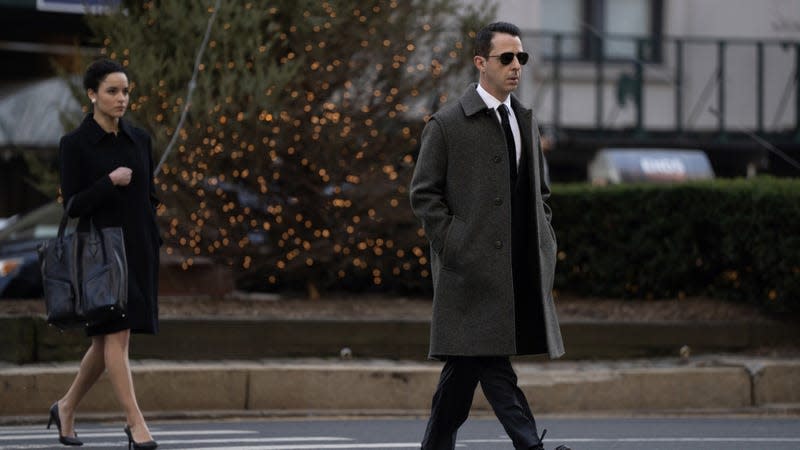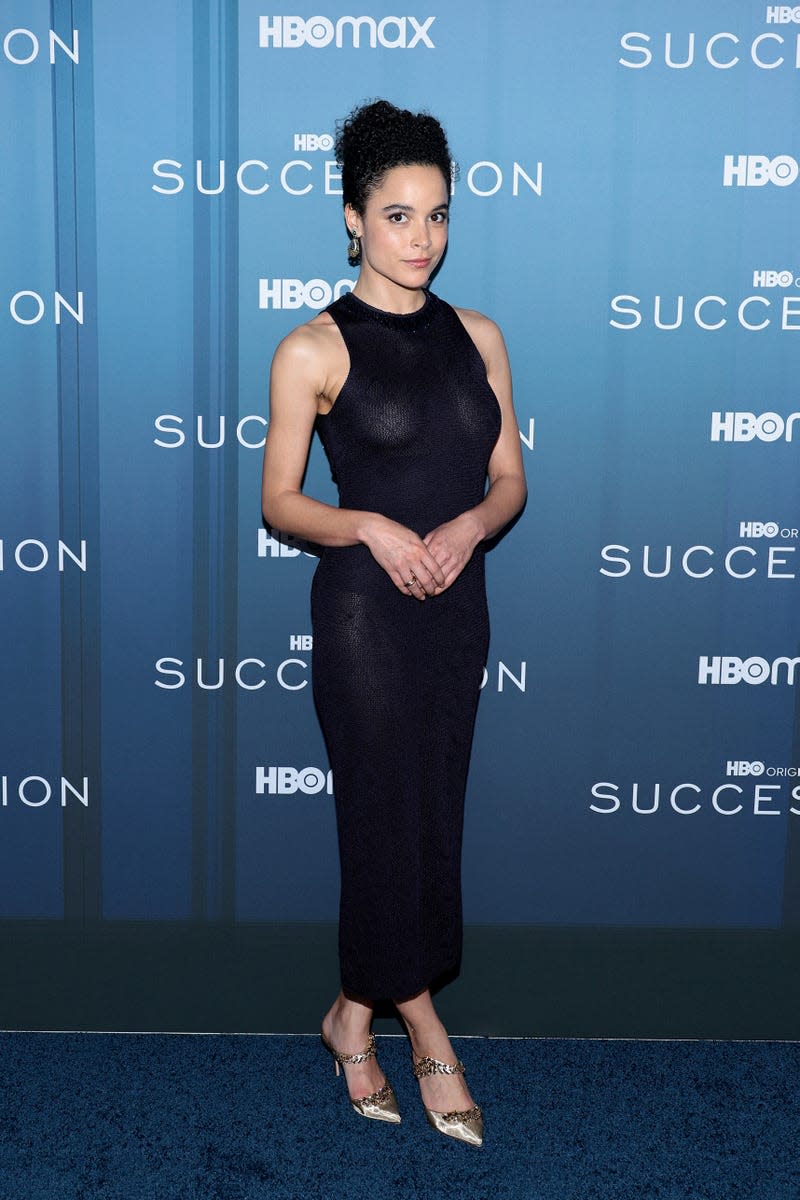Why Succession's Jess, the only Black Assistant, Did What She Had to Do

- Oops!Something went wrong.Please try again later.
Jess Jordan, the lone Black assistant on Succession, stood up for herself when it counted in the latest episode of the popular HBO series. She quits as personal assistant to Kendall Roy after he directs Waystar Royco’s American Television Network (ATN) to call the presidential election for a Trump-like candidate.
With or without protests around the nation, it’s a move that you’d expect from the only African American character who has a recurring role. It’s also a move that Black people can relate to – the moment when you must draw a line and stand firmly on the side of right. And, of course, it’s the kind of move that can be thrown in your face.
Read more
Aside from Halle Bailey, Here Are Other Black Disney Actors and Characters We Love [Update]
Megan Thee Stallion Becomes 1st Black Woman to Land Forbes 30 Under 30 Cover
15 Priceless Black Twitter Moments Worth Remembering [Updated]
Jess, portrayed by Juliana Canfield, stood out in this episode, not only because she confronted both her race and Kendall, but also because we’ve never heard her speak so much. Although Jess hasn’t had the most lines, her gestures and facial expressions spoke volumes to Black observers, setting off collective and supportive eye rolls.
The Ballad of The Lone Black Assistant:
A fan favorite, Jess has an extensive following on social media by people of all backgrounds who track her every move. “She’s the only one who’s actually competent at their job,” one woman said on TikTok. Jess especially resonates with Black viewers, largely because we see her in the fixer role we know all too well – fixing white people’s messes with little or no appreciation.
Then again, that’s what made her silence a bit unrealistic as Kendall’s cleanup woman since he has been such a hot mess. Throughout most of “Succession,” Kendall is trying to take over his father’s heart and media empire with mixed results, largely because he is an insecure narcissist who consumes drugs and alcohol with deadly consequences.
After all that had to be endured working for a Roy, I certainly wouldn’t have been biting my tongue, nor would any Black person I know. We’d say whatever needed to be said, however we needed to say it – to the point of “getting someone told,” as my grandmother Ida Mae Rice would say. And we’d go behind closed doors, if necessary, as I’ve had to do when someone pressed my buttons one time too many. When that happens and you’ve taken me out of my chill mode, I’m totally unapologetic about what comes next. Just sayin’.
Many fans have been lobbying for an episode all about Jess or one that has all the help spilling all the tea. Neither will happen at this point in the fourth and final season of Succession with the final episode next Sunday. However, Jess gradually gained more screen time for her memorable scenes.
For a better understanding of the world that this solo sister must navigate, here’s a glimpse of Roy Family Values as backstabbing siblings Kendall, Shivonne and Roman joke about the need for a codebook to interpret a newspaper’s description of their father, Logan Roy, in an obituary:
Shiv: “A complicated man.”
Kendall: “Ah, threw phones at staff.”
Shiv: “Sharp reader of the national mood.”
Roman: “He’s a bit racist.”
Shiv: “He was very much a man of his era.”
Kendall: “Again, racist. Also relaxed about sexual assault.”
Shiv: “Business genius.”
Roman: “Never paid a penny in U.S. tax.”
The Roys have been compared to the real-life Arnault, Hearst and Murdoch clans with similar drama that keeps Jess’s fingers perched on her forehead as if nursing yet another headache. Jess’s look of exasperation is especially priceless as she guides Kendall down hallways while he takes a call about the family rabbit’s bagel overdose that he had sanctioned. “Just call our doctor,” Kendall tells his children’s nanny. “If he can do people, he can do rabbits.”
Do Black Women understand Their Power?
Jess is always at the ready with whatever Kendall needs – from routine stuff like handling logistics for business trips or showing him pertinent video clips on her cell phone, to helping him escape protesters outside the office or fulfilling a midnight request for an early-morning screening. She saves Kendall from himself when he listens. If he doesn’t, he comes up short like the time Daddy Roy literally grounded him by yanking access to a flight.
Despite Kendall’s shortcomings, he’s the best of the Roys – loosely a liberal with the only piece of a moral compass in his entire family. When warranted, Jess will pat Kendall & Co. on the back. “Great job guys,” she says, peeking around a divider on a private plane just before a champagne toast to celebrate a successful business deal.
Viewers don’t see whether Jess and other assistants are included in the champagne toast. Until she quit, we also never saw how Jess asserted herself beyond pushing Kendall forward. It’s clear that it would be necessary in an elitist environment of white privilege laced with sexism and DEI issues.
As bell hooks noted in Feminist Theory: From Margin to Center, African American women do “not always understand the forms of power they could exercise” as consumers, as employees or in other roles. Such a perspective was never part of the script no matter how much Kendall and his family plucked her last good nerve.
By contrast, Tariq St. Patrick, a lowly intern on Power Book II: Ghost, calls out the head of the Weston family’s Wall Street firm for using him as window dressing to land a deal with Ron Samuel Jenkins, a wealthy African American investor. Jenkins aka RSJ also recognizes the ploy and insists on a bigger role for Tariq if the Westons want his business.
In “Succession,” we see a little pushback from Sanaa Lathan in a cameo as Lisa Arthur, the “best lawyer in town.” When Kendall ticks off a list of demands, Lisa responds, “I don’t do requests, because I’m not a DJ.”

After Kendall ignores her advice and flubs a deposition, Lisa asks him, “Do you think you’re smarter than me?” Kendall responds to her feedback like a child being scolded, later announcing to his team: “Lisa’s out. It turns out that she’s a toxic person.”
This is an all-too-familiar scenario for many Black people IRL. And that brings us back to the recent scene when Jess tells Kendall she’s out.
When Kendall notices that Jess has scheduled time on his calendar, he cavalierly says, “Let’s bump that,” but continues to pry about the reason for the upcoming meeting. “This is a big day,” Jess acknowledges before they enter the church for his father’s funeral. “I don’t want to do this.” Kendall still won’t let it go.
“Well, you have always been so supportive of me and my aims and ambitions, and I really appreciate that,” Jess finally responds. “So, I’m sure that you can understand that it might be a good time for me to move on to another position.”
Although Kendall acknowledges the sticky and racist politics, he is furious. That alone probably has Jess and most Black people cussing him out in her head. Kendall loses it, telling her that it’s a dumb, juvenile decision and that she’ll never regain such “extraordinary” access to power. Then in his truest sense of entitlement, Kendall lambastes her timing even though he’s the one who insisted on discussing it before the funeral – an occasion that he uses for business deals anyway.
Guess he never noticed that Black people will throw it all away, even sacrifice our very livelihood and lives, over racism.
The scene between Jess and family flunkie Greg Roy in the previous episode just before he delivers the directive to the ATN news team about the election was inexplicably intended to be funny. But “I saw it as deadly serious, existentially chilling and reminiscent of the 2016 election,” Canfield tells Vulture.
“Until that moment, she’s able to suspend belief about what it is she’s participating in,” Canfield says of Jess. “Then these new realities come crashing into one another, and the business interests of the person she works for are in line with the political interests of someone evil.”
Did Jess know that she, too, would be out of a good, bad job if she had been perceived as being too toxic, too Black or too smart or too whatever? Did she know it was coming? Did she have a personal life since she gave so much at the office? Or did her personal life get trampled, like Oprah Winfrey’s character in The Color Purple when she’s delayed in seeing her children for Christmas, because she’s ordered to drive Ms. Daisy after her little meltdown behind the wheel?
Clearly, Kendall recognizes that he needs Jess even if he rarely shows it.
In a telling scene, Kendall arrives alone for his first day temporarily leading the company after his father’s death. Jess is right behind him in the revolving door, dressed to impress in a black pantsuit accented in white with stilettos and a tight smile. When they spin out into the lobby, they are greeted by the company’s public relations representative and an entourage of handlers.
“Who are they?” Kendall asks.
“Additional manpower for the new role,” the PR rep explains.
“OK. Welcome additional manpower. They can f—- off until I need them,” Kendall responds as he heads toward the elevator with Jess – the real power and brain behind much of his current success. And that’s probably why he went off on her when she quit.
Yanick Rice Lamb, a Washington-based journalist, is a professor at Howard University and co-founder of FierceforBlackWomen.com.
More from The Root
A Supersized List of March 2023 Books by Black Authors We Can't Wait to Read
19 Political Karens Caught in Their Own Lies, Nonsense and Racism
Sign up for The Root's Newsletter. For the latest news, Facebook, Twitter and Instagram.

